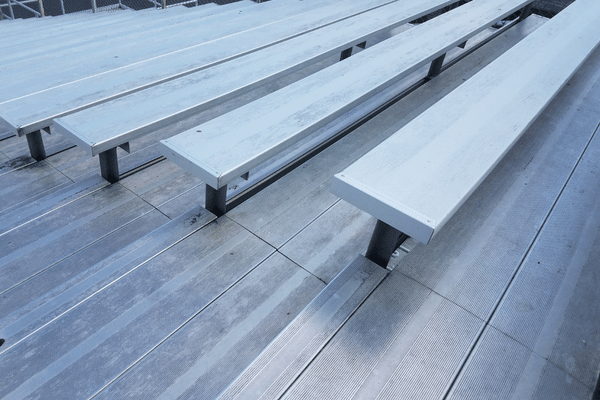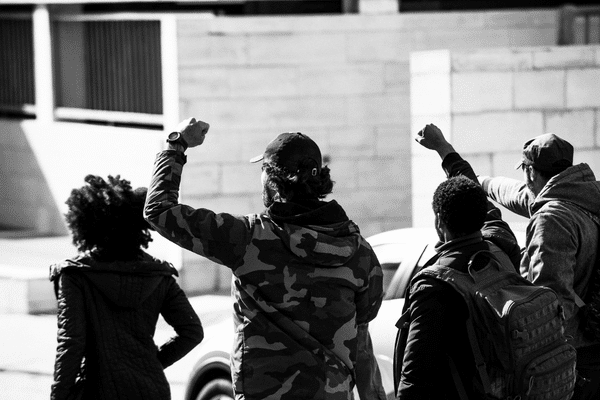My kneecap grinds into the slightly corrugated metal bleacher and I am acutely aware of both my physical and my emotional discomfort. Both rise in me as I take a knee, waiting to once again become anonymous, seated with the rest of the spectators.
 My physical discomfort when I take a knee, most of my weight pushing into that single, bony kneecap on a cold, hard surface, is far outweighed by the emotional discomfort of calling attention to myself while not engaging in an action that is so ingrained in every American that it is a part of American citizenship exams.
My physical discomfort when I take a knee, most of my weight pushing into that single, bony kneecap on a cold, hard surface, is far outweighed by the emotional discomfort of calling attention to myself while not engaging in an action that is so ingrained in every American that it is a part of American citizenship exams.
As a child, I obediently stood for the Pledge of Allegiance every day in school, and for the national anthem at sporting events. I continued this tradition as a privileged, white, adult physician even as I watched in horror as our country became increasingly racially divided. I cringed, horrified, as Black people were brutally murdered while at home in bed, while jogging, or while walking home. I saw our country fail large portions of our population.

I wasn’t always white bread middle class. The advantages I now enjoy were not a part of my childhood. I grew up a child of the 60s, attending anti-war protests as a grubby toddler.
We were poor, often hungry, qualified for the WIC program, and were on the Game Warden’s road kill list for meat. As hippies, we were not appreciated, or respected by mainstream America. My father, Marc Estrin, now an acclaimed author and publisher, still lists himself as an activist in his bio. I’m pretty sure I was arrested and booked (with my father) before the age of 3.

In rebellion against my hippy childhood, I moved center, ideologically speaking. I worked all through my childhood, saving every penny to put myself through college and medical school, and worked my way to my current, very comfortable life. As an adult, I live a privileged upper-middle-class existence as a highly educated, white female doctor living in one of the richest countries in the world.
While I have not always agreed with everything America stands for, I have not felt the need to make myself uncomfortable by protesting.
I’m not comfortable drawing attention to myself publicly when my views veer away from what is expected. I’m a rule follower. I am also aware of what it feels like to be poor and of the tremendous amount of work it took for me to achieve this level of financial security.
I live an honest, accountable life, treating all with the respect they deserve. That is my form of protest.
I protest xenophobia, homophobia, and racism on an individual level as a doctor and a person. I donate money to causes I believe in. As an Emergency Room Doctor, I devoted over two decades of my career to serving the healthcare needs of underserved populations. Poor people, Black and brown people, undocumented immigrants, and more. I saw people who had no primary healthcare, who accessed medical care at the Emergency Department, and then only when they were desperate.
I can see, however, that I have been so “anti-protest” (call it PTSD level anti-protest due to the tumult and observed violence of my childhood experience of protesting), I have not used my advantages to their full potential to affect change for those who are less advantaged. My discomfort and trauma kept me silent and passive.
But something in me changed. It broke or woke up when I saw how easily rights I considered unalienable were taken away from me. I cringe knowing it took an attack on my own rights for me to become aware of the gravity of systematic discrimination and violence against Black people in this country.
I suddenly understood what it feels like personally to have my basic human rights challenged.
The fall of Roe v. Wade made me realize that I need to protest more loudly and publicly. It made me realize that laws I have taken for granted are not assured. It made me realize that whatever progress the equal rights movement has made in my lifetime is not guaranteed. It made me realize that poor and brown and Black women will once again be disproportionately affected. Access to family planning, birth control, and safe/legal abortion further jeopardizes poor women and Black and brown women by forcing them to have children who need care rather than pursuing their education or careers. Additionally, poor women do not have the financial resources to travel to access legal abortions in other states if it is illegal in their own state.
Now I protest publicly and uncomfortably take a knee when the national anthem is played at sports events (which I attend a couple of times a week as one of the team doctors, sitting right adjacent to the team bench). I’m aware that this action falls far short of what is needed of me to help my marginalized fellow Americans, but it does draw attention to the fact that not everyone blindly backs the direction America is moving.
 I can not claim to know what it is like to be a Black person in America today. I can not imagine the pain of seeing one’s child beaten to death by police for no reason, or fearing that my son will be killed for a traffic stop or my daughter shot to death while at home in bed.
I can not claim to know what it is like to be a Black person in America today. I can not imagine the pain of seeing one’s child beaten to death by police for no reason, or fearing that my son will be killed for a traffic stop or my daughter shot to death while at home in bed.
However, seeing my legal right to access critically important health care revoked, makes me see that I have been a lazy ally. I have been lazy not only for Black people but also for non-cisgendered, non-heterosexual people. All of these people have long lived the reality of having their basic human rights threatened. All of these people have had to fear for their safety for just living their lives. I’m sorry I couldn’t bring myself to kneel (and more) with you in the past. I will take a knee moving forward.
Access to health care, including reproductive health care, is a human right. Now, with the repeal of Roe v. Wade, Black and brown women, transgender, poor women, and more face even more daunting challenges to accessing basic human rights that as a white woman, I can’t begin to comprehend.
As a physician, I see the repeal of Roe v. Wade, combined with the epidemic of police brutality against Black, particularly Black men, as a threat to our population’s health and well-being. This is a situation that no one in America should tolerate. I’m not sure how to affect change. I feel powerless in the face of the law and our pervasively racist culture. Even though it is an insignificant action, I no longer feel comfortable saluting our flag or standing for the anthem until America is safe for marginalized populations in both law and in practice.
Pin this post and be sure to follow Vermont Mom on Pinterest!










